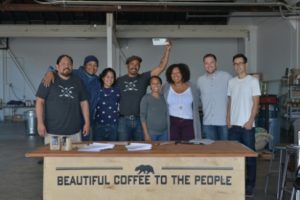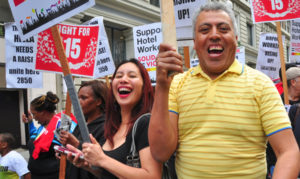The San Francisco Foundation has embarked on a bold agenda to create greater racial and economic equity throughout the Bay Area, looking at equity as a just and fair inclusion into a society in which all can participate, prosper, and reach their full potential. Jobs are an essential component to this strategy, since a good job, with a living wage, benefits, and safe and fair work environment, often means the difference between poverty and financial self-sufficiency.
So, we ask – what does a ‘good’ job look like? How do we ensure everyone has access to opportunity? Why are some Bay Area residents working 40 hours/week but struggle to feed their families?
In our second panel of our People, Place and Power series, Carmen Rojas, Orson Aguilar, Tim O’Reilly, Jim Wunderman and Joshua Johnson discussed what a thriving Bay Area could look like if everyone had opportunities that paid a fair wage, provided comprehensive benefits and contributed to a thriving community. The panel was hopeful that through conversations like these, we can look at combining ‘traditional’ ideas with the innovation of today to create sustainable and accessible jobs.
As we continue the conversations on ‘The Future of Work’ and consider the current environment, The San Francisco Foundation is investing in high-performing nonprofits that not only create and prepare residents for good jobs, but remove systemic barriers that keep many Bay Area residents from obtaining them – barriers such as immigration status, a criminal record, or unequal access to capital.
We recommend the following nonprofit organizations working to expand access to opportunity, some of which you’ll hear mentioned in the panel. We invite donors to learn more and partner with us in supporting them.
Create Good Jobs by Growing Local Businesses

Fund Good Jobs: Inner City Advisors (ICA) Fund Good Jobs works with local entrepreneurs that are dedicated to becoming good employers, helping them access investment capital, plan for growth, and hire individuals that historically lack economic opportunity. Based in Oakland, their new Good Jobs Accelerator will help promising local businesses create more good jobs faster by pairing capital investment with an accelerated training program that prepares these companies to scale. Since launching in 1996, small business entrepreneurs supported by ICA Fund Good Jobs have generated more than $1 billion in revenue and thousands of good jobs. With expert help from Fund Good Jobs, Red Bay Coffee’s rapidly expanding roasting business has created more than 20 good jobs in East Oakland since 2014.
La Cocina: La Cocina incubates and grows local food businesses by providing kitchen space, training, and entrée into a highly competitive industry for talented, low-income entrepreneurs ready to formalize and grow their businesses. Located in San Francisco and serving women, immigrants, and entrepreneurs of color, La Cocina’s graduates gain financial self-sufficiency and create jobs for their communities.
REDF: REDF is the only venture philanthropy in the U.S. that invests exclusively in the growth of social enterprises focused on employment. Social enterprises are double-bottom line businesses that employ those with formidable challenges to employment. Since 1997, REDF has provided seed and growth capital and specialized advisory services to over 60 social enterprises in California, which have earned and reinvested in their businesses more than $163 million in revenue and employed over 11,000 people, like Michael, helping spending for government programs go further while improving lives and communities. REDF is now aiming to grow social enterprises in the Bay Area to reach a goal of 36,000 employees.
Prepare Residents Re-Entering the Workforce after Incarceration
Center for Employment Opportunities (CEO): CEO gets men and women returning home from prison rapidly trained and employed, putting them on a path to financial self-sufficiency that reduces recidivism and breaks the cycle of poverty and incarceration. Through their innovative model combining immediate job placement with training, mentorship and financial incentives, clients find and retain jobs and contribute positively to their families and communities. Based in Oakland, CEO is expanding rapidly throughout the Bay Area.
 Ella Baker Center for Human Rights: Ella Baker Center works to end mass incarceration and criminalization and create opportunities for individuals, like Darris Young, and communities that have been harmed by disproportionate policing and punishment. With help from The San Francisco Foundation, they recently partnered with Restaurant Opportunities Center to found Restore Oakland. The new restaurant and job training program in Oakland’s diverse Fruitvale neighborhood will prepare residents with the greatest barriers to employment for top jobs in the Bay Area’s rapidly growing restaurant industry.
Ella Baker Center for Human Rights: Ella Baker Center works to end mass incarceration and criminalization and create opportunities for individuals, like Darris Young, and communities that have been harmed by disproportionate policing and punishment. With help from The San Francisco Foundation, they recently partnered with Restaurant Opportunities Center to found Restore Oakland. The new restaurant and job training program in Oakland’s diverse Fruitvale neighborhood will prepare residents with the greatest barriers to employment for top jobs in the Bay Area’s rapidly growing restaurant industry.
Reentry Success Center: Richmond’s Reentry Success Center is a hub that connects individuals coming out of prison and their families with resources to meet their short and long-term goals. Members access comprehensive services, from health and wellness to employment and education, while building a support network that allows them to build self-sufficient, satisfying and positive lives.
Activate Residents and Pass Policies to Improve Wages, Working Conditions and Job Opportunities
East Bay Alliance for a Sustainable Economy (EBASE): EBASE advances economic, racial, and social justice by developing strategic alliances among community, labor, and people of faith to build power and create change with low-income workers and communities of color.  Through collaboration and community organizing, EBASE is winning important campaigns across the East Bay to raise wages and worker protections, and ensure large-scale developments provide local residents with good jobs. It also unites community members to create good jobs and healthy communities for Bay Area residents.
Through collaboration and community organizing, EBASE is winning important campaigns across the East Bay to raise wages and worker protections, and ensure large-scale developments provide local residents with good jobs. It also unites community members to create good jobs and healthy communities for Bay Area residents.
Mujeres Unidas y Activas (MUA): MUA creates a multi-layered program that meets Latina immigrants where they are, addressing basic needs and dismantling the barriers that could easily prevent them from recognizing their own potential. Through the Caring Hands Workers Association, MUA helps Latina immigrants achieve dignified and just employment. They offer intensive employment trainings in the areas of green housecleaning, childcare, and in-home support for adults and people with disabilities, as well as bi-monthly job retention and skills building workshops and individual job counseling and placement support.
The Greenlining Institute: Experts in advancing policies that ensure race is never a barrier to economic opportunity, The Greenlining Institute spurs the creation of clean energy jobs with competitive wages and upward mobility for workers in communities historically left out of the growing green economy by advancing forward-thinking policies. Greenlining has successfully worked to pass and implement legislation that ensures the fees companies pay for their climate-damaging air pollution are used to create jobs in growing industries such as solar power and electric vehicles for the communities hit first and worst by pollution and poverty.
Working Partnerships USA: Working Partnerships USA is a community organization that drives the movement for a just economy by bringing together public policy innovation and the power of grassroots organizing to build the capacity of workers, low-income neighborhoods and communities of color to lead and govern. Based in Silicon Valley, they tackle the root causes of inequality and poverty by leading collaborative campaigns for quality jobs, healthy communities, equitable growth and vibrant democracy, winning recent victories to raise the minimum wage and convert cafeteria and shuttle contractors to full time employees with benefits.
Train Workers with the Greatest Barriers to Employment
Bay Area Codes: To insure that all residents have access to good jobs in the rapidly expanding tech sector, The San Francisco Foundation is investing in a cohort of groups that teach computer coding and create job opportunities for women, low-income young people, and people of color. For a list of recommended organizations, please see Bay Area Codes.
Multicultural Institute: For 25 years, the Multicultural Institute has helped immigrants acquire vocational, social, and educational skills to build self-sufficiency. They offer job placement assistance, educational and other training opportunities for youth, day laborers and economically disadvantaged immigrants throughout the Bay Area with branches in Berkeley, Richmond and Redwood City.
Old Skool Cafe: Old Skool Cafe is a faith-based, violence prevention program, providing marketable employment skills in the restaurant industry to at-risk youth ages 16-22. Located in the Bayview Hunter’s Point neighborhood of San Francisco, Old Skool Café provides the opportunity to transform the loop of incarceration and recidivism into healthy life loops. Youth come from jail, foster care or situations of abuse and neglect into a supportive environment. Youth create bonds at Old Skool Cafe and form a foundation that will be there to support them through the ups and downs of their life long after they leave the program.
Opportunity Junction: A hub for job seekers in Antioch, Opportunity Junction creates economic opportunity by providing a comprehensive program of skills training, work experience, job placement, and follow-up support that enables low-income residents of East Contra Costa County to embark on careers that lead to financial self-sufficiency. Serving more than 1,000 people annually, 90% of job training graduates are employed within six months, and 80% are still employed 18 months later.
Join us in working to advance racial and economic equity by expanding access to opportunity for all Bay Area residents. For more information, please contact donorservices@sff.org.

